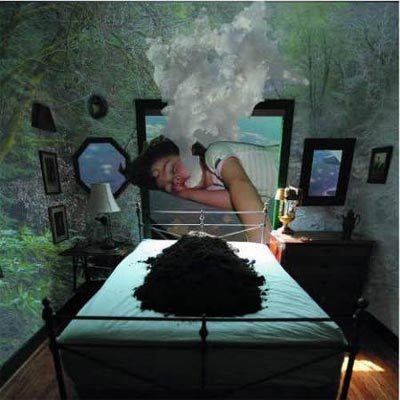
In Japan, Aokigahara is a forest at the base of Mount Fuji. Both a tourist destination of natural bounty and one of the top suicide sites in the world, it is simultaneously so lush it has been nicknamed Sea Of Trees and so mythologically curious that it has become associated with demonic presences. Exemplifying the region’s conflicting connotations is The Nocturne’s latest album. Aokigahara stirs up feelings from vague spaces — akin, perhaps, to what the morbidly curious feel when stumbling unexpectedly upon death. In circumstances when one can gain enough distance to view decay in its true artistic form, one can find in death the same sense of elation one finds in anything strange and novel.
With a singular reverbed inhalation from vocalist Emma Ruth Rundle, Aokigahara oozes dreamily into existence. It follows with the haunting line, “Life steals up my breath” — but contrary to instinct, the mortality captured by these lyrics is not sad. Sonically speaking, it might even be construed as hopeful. With ethereal textures framing the aery vocals, blacks and whites blur into hues of grey, evading definite emotions, like manifestations of dark dreams while one lies in the radiance of morning light.
Listen to “The Road” – DOWNLOAD MP3
Listen to “Love” – DOWNLOAD MP3
As expected from a band that includes two members from post-rock veterans Red Sparowes, The Nocturnes’ instrumentation is well-seasoned and dynamic. What makes their sound truly mesmerizing, though, is its inclusion of folk and shoegaze influences and the interweaving vocals of Rundle, guitarist Paris Patt, and guitarist Julian Rifkin. These components crystallize perfectly, particularly in the album’s first half, and are exemplified by the album’s strongest track, “The Road.” Despite ebbing and flowing from affirmations to negations and back, “The Road” maintains a wondrous sense of balance. Rundle and Patt seem to embody mournful ghosts reaching out to one another in the afterlife, the arrangements and melodies contributing a monastic quality of timelessness and eternal knowledge.
Aokigahara is a record focused on death and malaise, but it is also a comforting companion. By taking into account the bigger picture, The Nocturnes seem to perceive difficult themes from a vantage point outside of themselves, from a space that accepts and understands all.







[…] like a comforting, all-knowing, sympathetic companion. One of my favorites of the year. VIVIAN THE NOCTURNES – AOKIGAHARA ALBUM REVIEW DOWNLOAD […]
Nocturn (no-c-turn) no, never- c, re – turn, turn
To never return, a belief that comes to fruition of their own will. Their spirit is placed in a void, a complete blackness of black, where a desire of the tiniest light never found. Quite, is not even heard, a silence you call feel as the blackness that even you know even voids you. No screams can be heard, just a knowing that you will NEVER come back to ANYTHING.